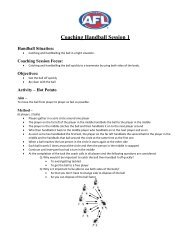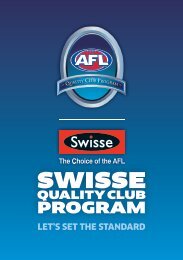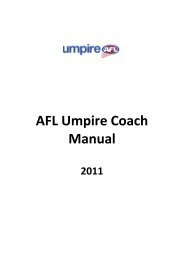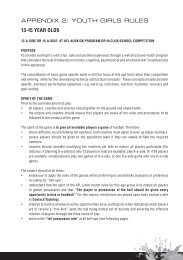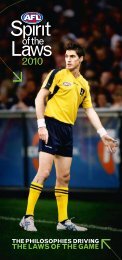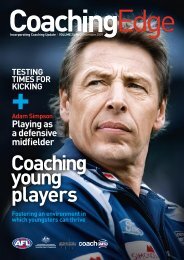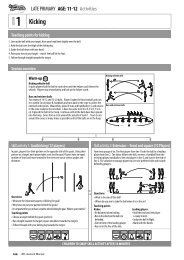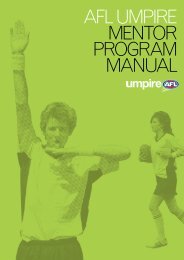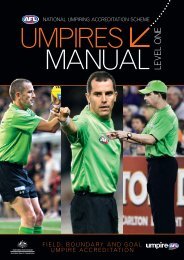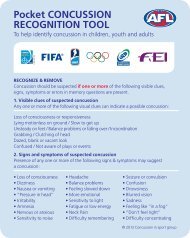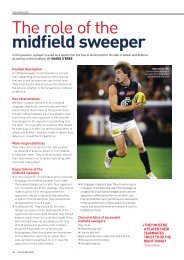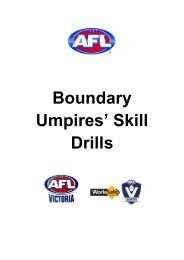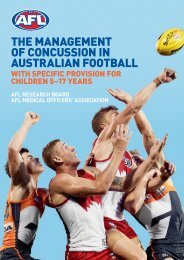Coaching Edge - AFL Community
Coaching Edge - AFL Community
Coaching Edge - AFL Community
Create successful ePaper yourself
Turn your PDF publications into a flip-book with our unique Google optimized e-Paper software.
When Richards joined the Swans,<br />
his mentor was Bolton, the 2005<br />
premiership full-back.<br />
Bolton had joined Sydney after limited<br />
opportunities with the Brisbane Lions.<br />
Richards was in awe of him and wanted to<br />
emulate his role as a premiership player.<br />
He did so last year and says the mentoring<br />
system remains important.<br />
“There’s ongoing discussion and reviews of<br />
how training is going and how they (new<br />
players) are handling things,” Richards said.<br />
“You want new guys to forge good<br />
relationships with teammates and to really<br />
fast-track their opportunities to push into<br />
the team.”<br />
It is not always easy for the young players at<br />
Sydney. They play for the Swans in the NE<strong>AFL</strong><br />
competition if they are not playing at <strong>AFL</strong><br />
level. The gap is huge and with a resilient list<br />
– the Swans used only 31 players at <strong>AFL</strong> level<br />
last season – how to keep the younger players<br />
satisfied and developing with purpose remains<br />
an ongoing challenge.<br />
As is maintaining a culture of continuous<br />
improvement, a characteristic that has helped<br />
the club win universal respect.<br />
“We are fully aware that it is a very hard<br />
thing to get going but a very easy thing to lose<br />
quickly,” Richards said. “We’re constantly<br />
aware of that.”<br />
Hannebery found out how that system of<br />
feedback operated a few pre-seasons back<br />
when he returned in worse shape than he<br />
should have and then broke his cheekbone<br />
jumping a fence over Christmas.<br />
His teammates let him know he wasn’t<br />
performing in a way that would enable him to<br />
be at his best. That meant he was letting<br />
them down – and letting himself down.<br />
Now he’s famous for his performance in<br />
last year’s Grand Final and, in particular, the<br />
courageous chest mark he took backing into<br />
traffic in the first half.<br />
“The mark wasn’t really anything special,”<br />
Hannebery said. “I suppose what magnified it<br />
was that (Hawthorn ruckman David) Hale<br />
collected me at the right time.”<br />
Hannebery emphasised that any of his<br />
teammates would have done the same thing<br />
if caught in the same position.<br />
“It is expected of us,” he said.<br />
Teammates shrugged in admiration at<br />
the heroics of Goodes in the Grand Final when<br />
he kept playing after suffering a posterior<br />
cruciate ligament injury. Richards played with<br />
a dodgy ankle.<br />
Longmire knows there is no chance for the<br />
club to rest on its laurels.<br />
Although he hopes the players have gained<br />
a belief from their finals efforts, he knows past<br />
performances mean little this season.<br />
“The moment you stop that quest for<br />
improvement is the moment you give it up and<br />
start to do something else because it’s a very<br />
demanding industry,” he said.<br />
Such humility allows players to<br />
remember what put them into contention<br />
in the first place.<br />
“We can’t ever just sit back and relax,”<br />
Longmire said. “You need to keep trying<br />
to improve all the time in every aspect of<br />
what we do.”<br />
That approach didn’t stop the club<br />
making time to celebrate its 2012<br />
achievements. That’s the beauty of sport<br />
and why once the relief subsided, Longmire<br />
was able to see the win for what it was.<br />
“You do have moments of self-reflection,”<br />
he said. “You need to enjoy it for what it is<br />
because it’s very difficult to do.”<br />
Hannebery said the five minutes when the<br />
football department and the players gathered<br />
after the game were special.<br />
“We talked about different moments of<br />
the game and all had a laugh and ‘Horse’<br />
(Longmire) had a few words to say,” he said.<br />
“It was a great time to reflect on the game<br />
and the year. It was pretty emotional and a<br />
special time.”<br />
It is what football is all about, a moment to<br />
make 2006, when the Swans lost the Grand<br />
Final to West Coast, fade into the background<br />
for players such as Richards and McVeigh.<br />
“At the time, the loss played on my mind<br />
a bit, but now I don’t really care about it,”<br />
McVeigh said.<br />
His post-game talk in Geelong came when<br />
hope remained, but doubt so easily could have<br />
taken hold.<br />
At that time, he had played in one<br />
Grand Final for one loss. Now he is a<br />
premiership player. And he will watch<br />
with pride as the premiership flag is raised<br />
pre-game this weekend.<br />
This article appeared in the round one<br />
edition of the <strong>AFL</strong> Record.<br />
GRAND FINAL STAR:<br />
Canadian-born Mike Pyke<br />
played the game of his<br />
life in the Grand Final.<br />
COACHING EDGE / JUNE JULY 2013 // 9



